Using Powershell I retrieve all third party drivers installed using:
$PNPDrivers = PNPUtil /Enum-Drivers
The format of the information retrieved are as followed:
Microsoft PnP Utility
Published Name: oem19.inf
Original Name: apollolakesystem.inf
Provider Name: INTEL
Class Name: Systemenheter
Class GUID: {4d36e97d-e325-11ce-bfc1-08002be10318}
Driver Version: 07/18/1968 10.1.17.1
Signer Name: Microsoft Windows Hardware Compatibility Publisher
Published Name: oem20.inf
Original Name: avotonsystem.inf
Provider Name: INTEL
Class Name: Systemenheter
Class GUID: {4d36e97d-e325-11ce-bfc1-08002be10318}
Driver Version: 07/18/1968 10.1.3.1
Signer Name: Microsoft Windows Hardware Compatibility Publisher
I'm trying to make a foreach loop so that each driver are added to an array with PSObject so that I can fetch required information later on in the script.
I have tried so many combinations but never succeeded. Right now I have tried a regex expression and group each row in order to specify each value but I don't get any data what so ever.
Below is the Regex expression I have used which seems to work?
After that I've tried to follow the information from this link: Parsing Text with PowerShell Just changing the information to match my code:
$Pattern = "
^(?<PublishedName>Published Name:.*)
^(?<OriginalName>Original Name:.*)
^(?<ProviderName>Provider Name:.*)
^(?<ClassName>Class Name:.*)
^(?<ClassGUID>Class GUID:.*)
^(?<DriverVersion>Driver Version:.*)
^(?<SignerName>Signer Name:.*)
"
$PNPDrivers |
Select-String -Pattern $Pattern |
Foreach-Object {
# here we access the groups by name instead of by index
$PublishedName, $OriginalName, $ProviderName, $ClassName, $ClassGUID, $DriverVersion, $SignerName = $_.Matches[0].Groups['PublishedName', 'OriginalName', 'ProviderName', 'ClassName', 'ClassGUID', 'DriverVersion', 'SignerName'].Value
[PSCustomObject] @{
PublishedName = $PublishedName
OriginalName = $OriginalName
ProviderName = $ProviderName
ClassName = $ClassName
ClassGUID = $ClassGUID
DriverVersion = $DriverVersion
SignerName = $SignerName
}
}
But no data is printed out so I must be missing some but I don't manage to find what. How can I do to retrieve the data and for each driver use it?
Second try
The code below gives me all values (I think) but it splits it to one row each. I guess this is because it doesn't match all rexeg:s at the same time. Can this be changed?
$Pattern = "(^(?<PublishedName>^Published Name:\s*([^\n\r]*)))|(^(?<OriginalName>^Original Name:\s*([^\n\r]*)))|(^(?<ProviderName>^Provider Name:\s*([^\n\r]*)))|(^(?<ClassName>^Class Name:\s*([^\n\r]*)))|(^(?<ClassGUID>^Class GUID:\s*([^\n\r]*)))|(^(?<DriverVersion>^Driver Version:\s*([^\n\r]*)))|(^(?<SignerName>^Signer Name:\s*([^\n\r]*)))"
$PNPDrivers |
Select-String -Pattern $Pattern -AllMatch |
Foreach-Object {
# here we access the groups by name instead of by index
$PublishedName, $OriginalName, $ProviderName, $ClassName, $ClassGUID, $DriverVersion, $SignerName = $_.Matches[0].Groups['PublishedName', 'OriginalName', 'ProviderName', 'ClassName', 'ClassGUID', 'DriverVersion', 'SignerName'].Value
[PSCustomObject] @{
PublishedName = $PublishedName -replace "Published Name: ",""
OriginalName = $OriginalName -replace "Original Name: ",""
ProviderName = $ProviderName -replace "Provider Name: ",""
ClassName = $ClassName -replace "Class Name: ",""
ClassGUID = $ClassGUID -replace "Class GUID: ",""
DriverVersion = $DriverVersion -replace "Driver Version: ",""
SignerName = $SignerName -replace "Signer Name: ",""
}
}
Third try
Almost there! So close! You are the man postanote!
Since I am going to loop through a package of drivers in our SCCM enviroment working with [PSCustomObject] seems to be the right way to do it.
Although the problem that persists seems to be that some rows get "out of sync" and displays wrong value for the column.
Any thoughts on how to correct that?
Fourth try
Working code!!
$List = New-Object System.Collections.ArrayList
((PNPUtil /Enum-Drivers |
Select-Object -Skip 2) |
Select-String -Pattern 'Published Name:' -Context 0,7) |
ForEach {
if($PSItem.Context.PostContext[4] -like "*Class Version:*"){
$ClassVersion = $PSItem.Context.PostContext[4] -replace '.*:\s+'
$DriverVersion = $PSItem.Context.PostContext[5] -replace '.*:\s+'
$SignerName = $PSItem.Context.PostContext[6] -replace '.*:\s+'
}else{
$ClassVersion = "N/A"
$DriverVersion = $PSItem.Context.PostContext[4] -replace '.*:\s+'
$SignerName = $PSItem.Context.PostContext[5] -replace '.*:\s+'
}
$y = New-Object PSCustomObject
$y | Add-Member -Membertype NoteProperty -Name PublishedName -value (($PSitem | Select-String -Pattern 'Published Name:' ) -replace '.*:\s+')
$y | Add-Member -Membertype NoteProperty -Name OriginalName -value (($PSItem.Context.PostContext[0]) -replace '.*:\s+')
$y | Add-Member -Membertype NoteProperty -Name ProviderName -value (($PSItem.Context.PostContext[1]) -replace '.*:\s+')
$y | Add-Member -Membertype NoteProperty -Name ClassName -value (($PSItem.Context.PostContext[2]) -replace '.*:\s+')
$y | Add-Member -Membertype NoteProperty -Name ClassGUID -value (($PSItem.Context.PostContext[3]) -replace '.*:\s+')
$y | Add-Member -Membertype NoteProperty -Name ClassVersion -value $ClassVersion
$y | Add-Member -Membertype NoteProperty -Name DriverVersion -value $DriverVersion
$y | Add-Member -Membertype NoteProperty -Name SignerName -value $SignerName
$z = $List.Add($y)
}


